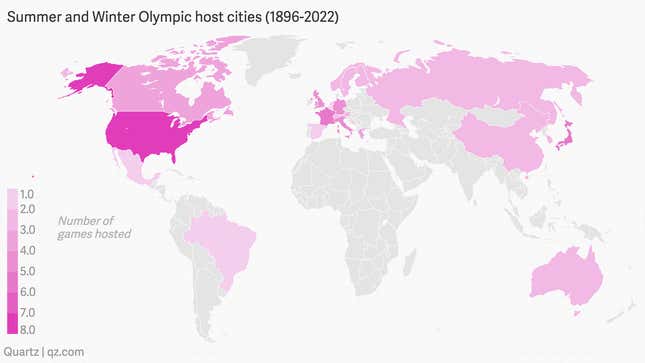The International Olympic Committee (IOC) has selected the city of Beijing to host the 2022 Winter Olympic Games. It beat out Almaty, largest city in the expansive Central Asian republic of Kazakhstan. This makes Beijing the first city to host both the summer and the winter Olympic games, a sort of honor. But wouldn’t it be better if both Almaty and Beijing had shared the games? Or better, still, that cities around the world bear the burden of the Olympics, simultaneously?
The IOC has long fielded criticism for favoring individual cities in Europe and North America as hosts. As evidenced by the map below, countries with the most geopolitical and economic clout have generally hosted the greatest number of Olympic games. So for nations that have never before hosted a major, international sporting event, the Olympics may be seen as a gateway to first-world status.

In recent years, many cities in rising economies have made impressive bids at game-hosting privileges. Rio, Istanbul, and Havana all made bids for the 2012 games; Baku and Doha vied for 2016; and Istanbul, Baku, and Doha all bid once more for 2020 (which ultimately went to Tokyo). These last three are once more considering bids, this time for the 2024 summer games, along with Nairobi, Casablanca, and Kuala Lumpur-Singapore (bidding as a dual package).
But with the privilege of hosting comes responsibilities—governments must invest large sums of money to build up infrastructure in a short period of time. And in places without reliable systems in place to ensure development is pursued ethically, it’s ordinary citizens that suffer most.
Expensive, slapdash construction projects like arenas and pavilions give rise to bountiful opportunities for human-rights abuse. Doha, host to the 2022 FIFA World Cup, has come under intense international criticism for reported human-rights violations committed in the rapid build-up, as hundreds of guest workers have died constructing the World Cup stadium in Qatar.
When Azerbaijan hosted the 2015 European Games, local opponents of the event were arrested, a crackdown on local journalists appeared to intensify, and scores of opposition leaders were jailed.
Some say the Russian city of Sochi’s hosting privileges for the winter 2014 Olympic games actually emboldened Russian president Vladimir Putin’s interferences in Ukraine. Just across the Black Sea was Crimea, which the Russian Federation annexed against international law a few months prior, and Eastern Ukraine, where Russian forces have been accused of stoking a violent secessionist movement. Indeed, Sochi was a bright spot in a year of bad PR for the Moscow; Ukrainian athletes even opting to compete.
The IOC does not seem yet to have figured out how to take human rights records into account when selecting Olympic Games sites. And the fact that this week’s decision for the 2022 winter games came down to Beijing, China and Almaty, Kazakhstan—both cities in countries with notoriously poor human-rights records—suggests that the IOC is not racing to do so.
The quick solution? Do away with host cities all together.
The concept of a single city hosting international games is redundant. The Olympics were only ever consolidated to a single city because, when the games began at the end of the 19th century, travel was far more expensive and impractical than it is today. It wouldn’t have been feasible for German or American press to cover a footrace in Montreal, archery in Melbourne, and shot put in Moscow simultaneously.
In 2015, why can’t ski jumpers jump in Geneva, while ice dancers dance in Almaty? Why can’t swimmers swim in Sydney while sprinters sprint in Nairobi? The infrastructure for any city to host a handful of events surely exists, meaning human-rights abuses and human-trafficking linked to construction labor will be minimal. And because news cameras from around the world won’t be trained on a single city for more than a few days, repressive regimes might not be as sensitive to expressions of dissidence.
Abolishing the tradition of a single host city would also address that chief criticism of the Olympics—that the IOC favors Western locales above all other. The 28 sports featured in the 2016 Summer Olympics could have been easily divided between Rio, Tokyo, Prague, Madrid, Doha, Chicago, and Baku; four events per city. That’s less taxpayer money spent per host city, lower instances of human-rights abuse, and, admittedly, still a dash of good PR for repressive governments. Everybody wins.
